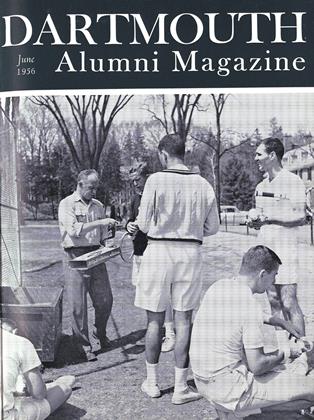By Bertram R. Crane andRoger M. Hoffman '41. New York: CentralBook Co., 1956. 307 pp. $5.95.
The "big strike" makes the news in labor-management relations. But, of course, for each major strike (or strike threat) there are thousands of labor relations differences settled amiably and privately by the two parties alone. The lion's share of the credit for this encouraging fact must inevitably go to the processes of grievance handling. Yet it is curious that so little published material has pointed alone to this critical facet of labor relations. The authors of this book have concentrated on this need; their results will be rewarding to anyone, labor or management, having operating responsibility for grievance procedures.
The authors first delineate the objectives of a sound grievance procedure and provide the reader with an extensive analysis of the problems involved in circumscribing what is involved in a grievance. Then the mechanics of grievance machinery are reviewed - determining the proper steps, the time limitation question, the framing of the contract clause and the ever-sensitive question of pay allowances for grievance time.
The remainder of the book is devoted to operational problems, with particular emphasis on preventive policies. Particularly valuable here should be the chapters devoted to the foreman's and shop steward's roles in meeting grievance problems at an early organizational level.
While any labor relations specialist should readily appreciate the practical applications of such a book, it would seem particularly valuable to the thousands of small businesses and local unions that cannot afford extensive research aid. The easily-understood style of the book and its companion 50-page appendix should fill a real need here.
 View Full Issue
View Full Issue
More From This Issue
-
 Feature
FeatureThe Reynold Scholars
June 1956 By PROF. JOHN HURD '21 -
 Feature
FeatureLEARN AMERICAN
June 1956 By EDWARD C. KIRKLAND '16 -
 Feature
FeatureA NEW CONCEPT of Dormitory Living
June 1956 -
 Feature
FeatureTHE NICHOLS ERA
June 1956 -
 Class Notes
Class Notes1918
June 1956 By ERNEST H. EARLEY, RICHARD A. HOLTON -
 Class Notes
Class Notes1926
June 1956 By HERBERT H. HARWOOD, ANDREW J. O'CONNOR
WAYNE G. BROEHL JR.
Books
-
 Books
BooksALUMNI PUBLICATIONS
April 1920 -
 Books
BooksANATOMY AND PHYSIOLOGY OF SPEECH.
July 1960 By CARL D. ENGLAND -
 Books
BooksEINSTEIN: A PICTORIAL BIOGRAPHY.
June 1956 By CLIFFORD L. JORDAN '45 -
 Books
BooksTRANSACTIONS: THE INTERPLAY BETWEEN INDIVIDUAL, FAMILY, AND SOCIETY.
JUNE 1972 By MARTIN D. MERRY, M.D -
 Books
BooksALL THE BEST IN HAWAII
January 1950 By Mildred L. Saunders -
 Books
BooksWINNERS
November 1933 By William A. Eddy




